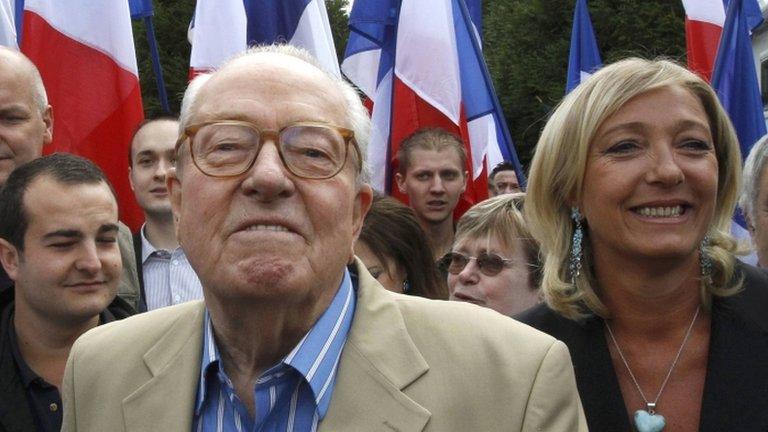Marine Le Pen: Taking France's National Front out of the shadows
- Published
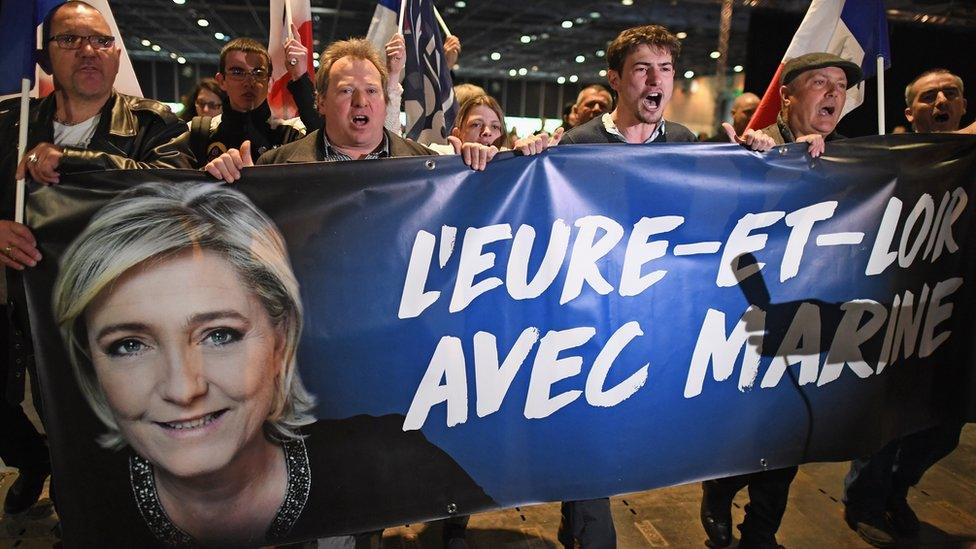
Marine Le Pen has galvanised fresh support for a once "untouchable" party among a sizeable portion of French voters
"Far right with a human face" was how French philosopher Bernard-Henri Lévy described Marine Le Pen in 2010.
The description came in an essay on elections, external that saw her National Front (FN) party attract a record 6.8 million voters. And she was the author of "this metamorphosis" that had "transformed the FN into a possible party of government".
Lévy's prediction was prescient. In the 2017 presidential election Marine Le Pen reached the second round with a new record of just under 7.7 million votes.
She subsequently lost to Emmanuel Macron by a large margin, but still won a projected 34.5% of the vote, far surpassing the 17.8% her father, Jean-Marie, took in 2002, when the far right last reached the run-off.
Her strategy of "detoxification" of the FN's image since she wrestled the leadership from her father, a convicted racist, in 2011 seems to have been effective, even if not yet effective enough to propel her to the presidency.
Since losing, she has already called for a "deep transformation" of the party - raising the prospect of a re-launched political force under a different name.
'Psychological rupture'
Born the youngest of Jean-Marie Le Pen's three daughters in 1968, Marine Le Pen was eight years old when the family flat in Paris was blown up in a bomb attack, though nobody was hurt.
It was 1972, four years after her father had founded the National Front.
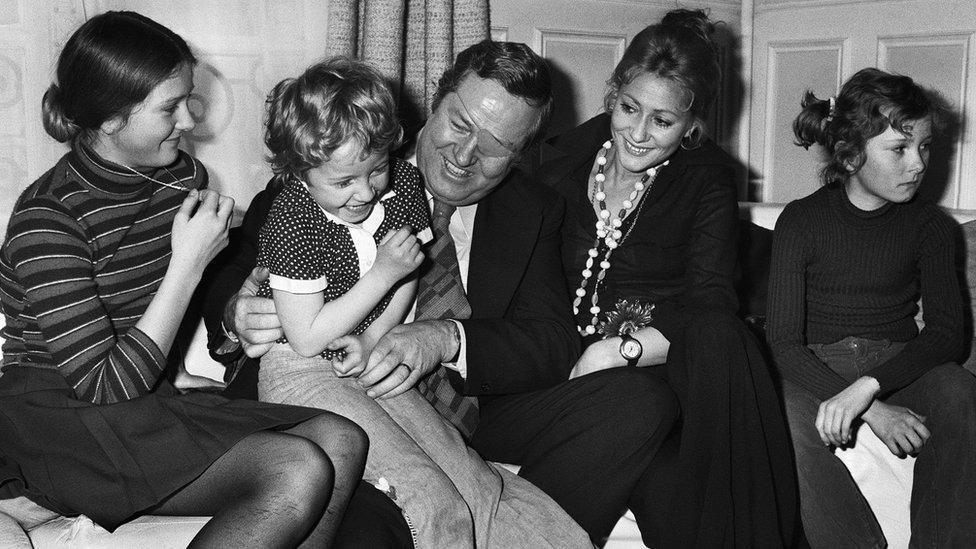
Marine sits on her father Jean-Marie's lap in 1974, with her mother Pierette to his right and her sisters on either side.
More trauma was to come when she was 16 and her mother Pierrette ran off with the man writing Jean-Marie Le Pen's biography.
Jean-Marc Simon, Marine Le Pen's biographer, says: "[The] brutal departure of the mother was a drama for Marine.
"She was only 16 and very close to her mother - they had the same rhythm, they cooked together, she followed her as much as possible. So there's a huge psychological rupture there."


That abandonment was to bring Marine much closer to her father, says Mr Simon.
The youngest daughter became steeped in politics from a young age, accompanying her father to meetings and rallies.
She first campaigned with him when she was 13 years old.
But their relationship would turn sour decades later in a very public feud that threatened to plunge the party into crisis.
The rift was laid bare after Mr Le Pen gave a radio interview in April 2015 in which he repeated an old anti-Semitic slur that the Nazi gas chambers were "a detail of history".
His daughter denounced his comments and he was expelled from the FN in August 2015.
Defending illegal immigrants
Marine Le Pen had trained as a lawyer at one of France's top law schools.
She signed up as a public defender who would take any case where the defendant could not afford a lawyer.
That meant acting at times for illegal immigrants, something some of her rivals in the FN have held against her.
Paris barrister Basile Ader, who faced Ms Le Pen across the courtroom on occasion, remembers her as "a good lawyer [who] worked hard, did her homework and was on top of things".
"I admired how she kept her cool and was able to maintain normal professional relationships despite being burdened with the notoriety of her father."
In 1998, she ceased practising and became the head of the FN's legal department.
After years of fighting and losing French parliamentary elections, she was elected to the European parliament in 2004 and remains an MEP, representing North-West France.
With her two divorces, steely femininity and cigarette-roughened voice, the mother-of-three comes across as far more "normal" than most of her political rivals, says the BBC's Hugh Schofield.
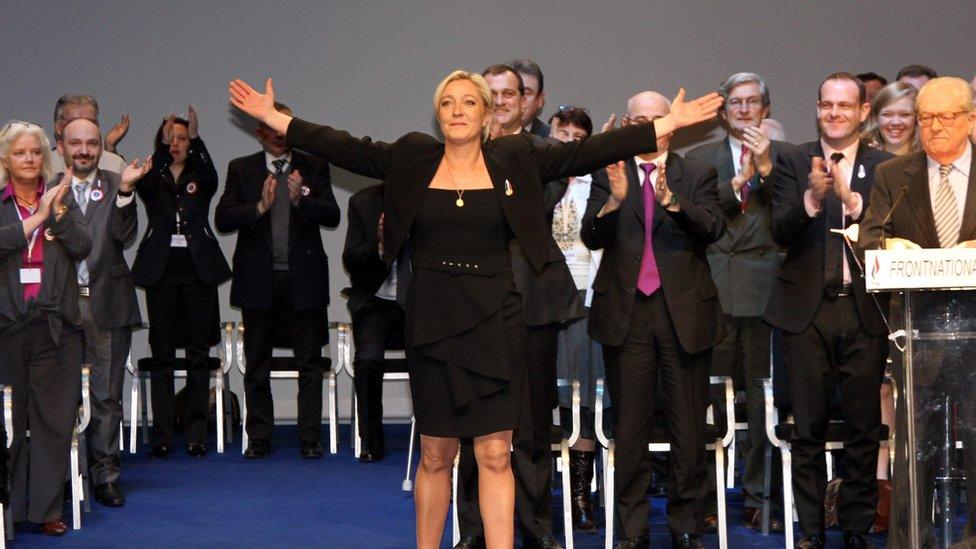
Moment of victory: Marine Le Pen basks in delegate applause on 16 January 2011, after she was elected party in place of her father (far right)
After taking over as leader in 2011, she based her approach on emphasising threats to the French way of life.
The fight against "Islamification" was still high on the party's agenda - but so were its campaigns against globalisation, the EU and the euro.
A more liberal stance on social issues, including women's issues and gay rights, gave the party fresh appeal to hitherto hostile voters.
In the 2012 presidential election, Ms Le Pen came third, but with a higher percentage of the vote than her father got in 2002.
In European elections in 2014, the FN topped the polls - the party's first victory in a national election.
And as the run-off round drew near in 2017, Marine Le Pen was polling at about 40%, still well short of Emmanuel Macron, but power now appeared within sight.
When she stepped aside temporarily as leader of the FN, to show she could be a leader of all French people not just her party, her critics dismissed the move as a stunt.
'Inherit or merit'
Ms Le Pen has objected to the use of the term "far right", arguing that it marginalises a party with significant support.
She emphasises the fact that the party today has grown to include Jewish and Muslim members.
Nonetheless, for some analysts - and many anti-FN protesters - behind the softer exterior, the FN's policies remain extreme.
"French citizenship should be either inherited or merited," Ms Le Pen has declared, vowing to end free education for children of undocumented migrants.
She reverted to a hard line during the 2017 presidential campaign, pledging an immediate suspension of all legal migration in an apparent bid to shore up grassroots support.
But many of her ideas have become more mainstream, such as her campaign to bring back France's old currency, the franc.
- Published4 December 2015
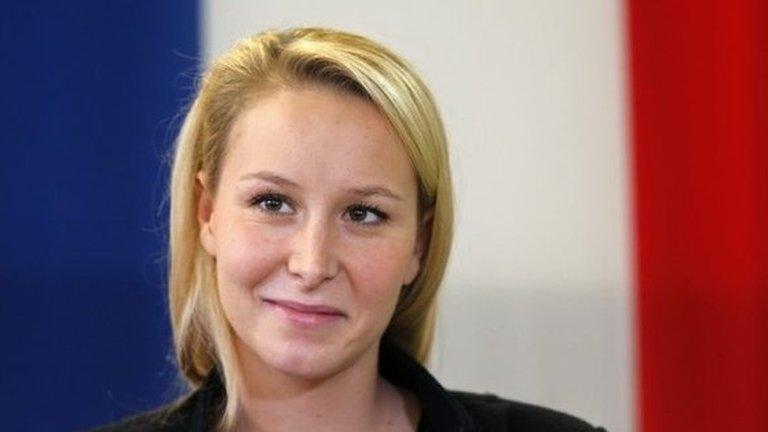
- Published7 December 2015
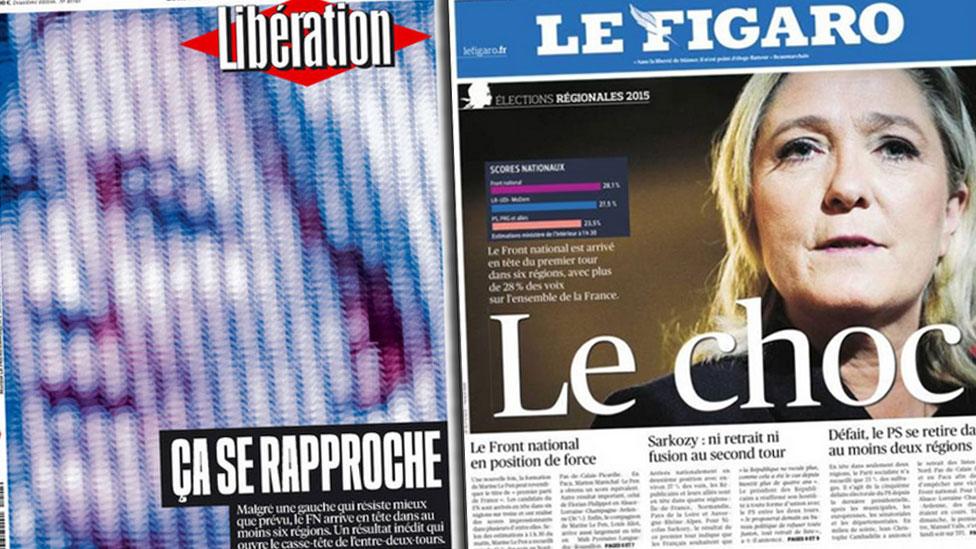
- Published5 December 2015
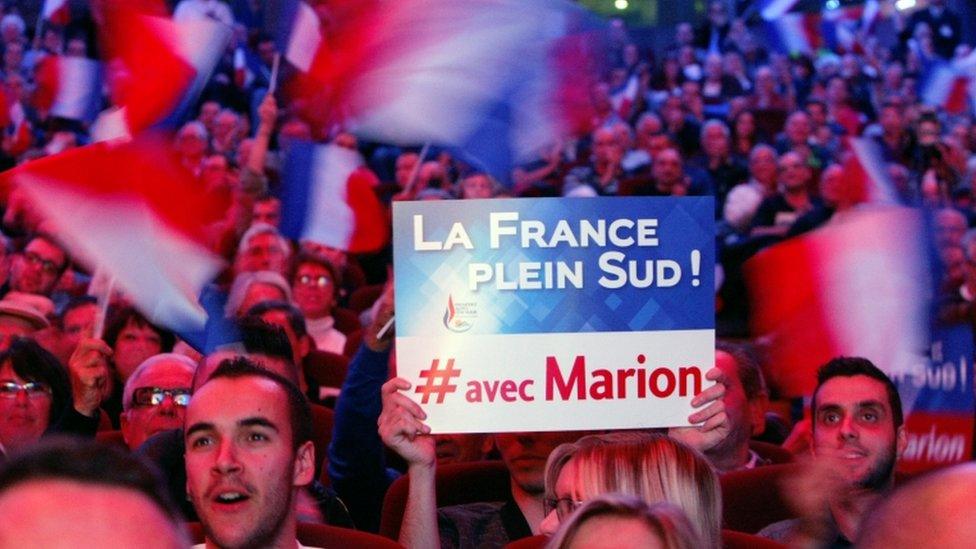
- Published22 May 2015
